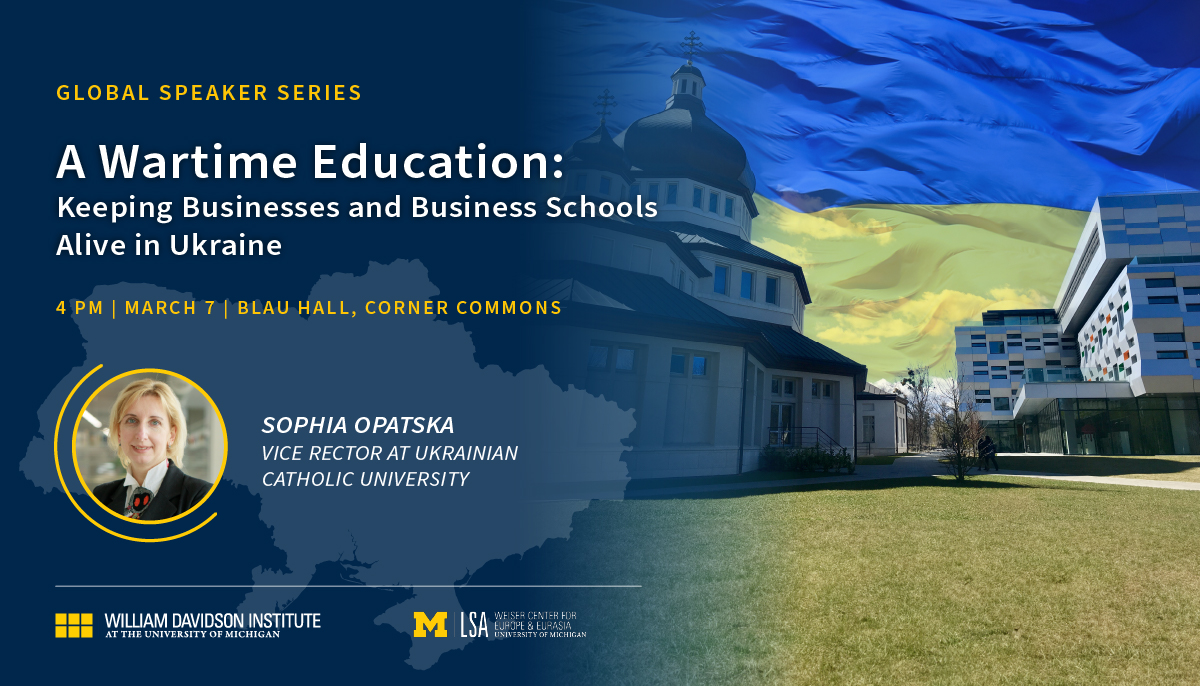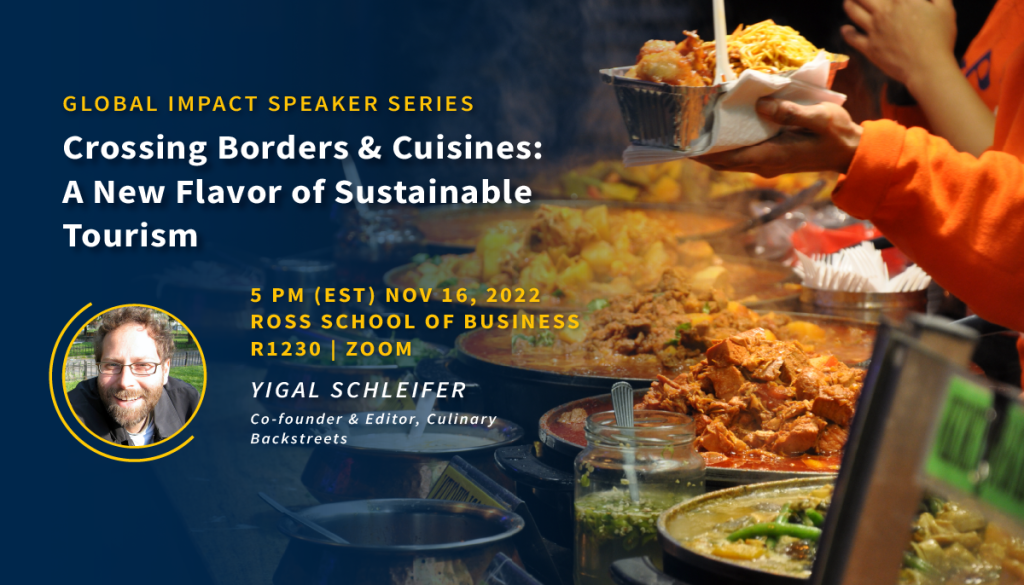Time: 4 p.m., March 7
Location: Corner Commons, first floor of the Blau Building at the Ross School of Business
The William Davidson Institute and the Weiser Center for Europe and Eurasia are proud to present a discussion with Sophia Opatska, Vice Rector for Strategic Development at Ukrainian Catholic University. Opatska, an entrepreneur and an academic, leads University’s Lviv Business School. More than two years after Russia’s invasion of Ukraine, Opatska will explain how business leaders and business educators have persisted toward economic resilience in the face of war.
Through student programs, projects and university partnerships, WDI has worked in Ukraine for more than two decades. Before Russia’s invasion, the Institute sent multiple teams of U-M MBA students to Lviv Business School of Ukrainian Catholic University to assess and make recommendations to improve their consulting process for small- and medium-sized businesses in the country.
This event is open to the public. Attendees are encouraged to register and submit questions in advance. Light refreshments will be served.


The world needs a major investment boost around energy output and infrastructure to meet challenges related to demand, security, and sustainability — and many of the changes will take place in emerging markets. Leaders in these nations are working hard to achieve ambitious development goals, and governments, businesses, and other stakeholders will be integral in securing the $1.3 trillion that is estimated to be needed to support the growing global population, according to J.P. Morgan’s Annual Energy Outlook. Fulfilling this demand calls for innovation, and innovation requires new voices and new ways of improving business knowledge.
This is why the William Davidson Institute at the University of Michigan (WDI) has launched the Energy Innovation in Low- and Middle-Income Countries Global Case Writing Competition. Administered by WDI Publishing, the contest is seeking new voices and expertise in the form of business case studies.
Case studies encourage current and future business leaders to expand their education, question their assumptions and discover innovative strategies. The development and use of these cases will help accelerate global understanding of the energy technologies and innovations being implemented by businesses operating in low- and middle-income countries (LMICs).
At the moment, the energy industry is facing large-scale and complex challenges, while the transition away from fossil fuels is creating new opportunities, especially in LMICs. According to the International Renewable Energy Agency, 733 million people are currently living without electricity and 2.6 billion people — many of whom are in LMICs — cook or heat their homes with fuels that are harmful to their health and the environment. These challenges can’t be resolved with old solutions and ways of thinking. Universities and colleges have the power to integrate new approaches and business models for energy challenges into their curricula to prepare the next generation of decision-makers.
“Global competitions like this can draw out new research and initiatives that we may not otherwise know about,” said Sandra Draheim, Manager of Case Publishing at WDI. “By incentivizing and rewarding the development of new cases, we aim to help students to be better informed and equipped to lead companies into the future, especially those companies focused on generating and executing innovative energy solutions in emerging markets. WDI’s case writing competition seeks to broaden and increase the pool of studies available on this essential topic.”
Students, faculty and professionals connected to the energy industry in LMICs are uniquely positioned to enhance this discussion. “Many of these changes are happening rapidly, and maybe not yet at a large scale, so new case studies can add a lot of value to the knowledge around this topic by capturing lessons learned in real-time, analyzing what is and is not working, and shining a spotlight on promising approaches,” says Dana Gorodetsky, Program Manager of Energy at WDI.
With that in mind, WDI’s Energy Innovation in Low- and Middle-Income Countries Global Case Writing Competition is a call for cases focused on compelling energy questions arising from profit-seeking businesses in emerging markets.
The competition is open to submissions from practitioners, students and faculty from around the globe. Practitioners and students must enter in collaboration with a faculty member.
An informational webinar will be held at 10 am EST, Dec. 14, and will provide an overview of the competition, as well as case writing tips. Intent-to-Enter forms are due on Jan. 31, 2023, and the final submission deadline is March 31, 2023. Find the submission requirements here.
Finalist cases will be reviewed and ranked by several industry experts: Deeana Ahmed, Vice President of Strategy, Policy, and Sustainability at ONE; Kate Gasparro, Director of Land Development and Sustainability at Bedrock Detroit; Ann O’Hara, President of Huhtamaki North America; and Dan Vermeer, Associate Professor of the Practice of Energy & Environment and Executive Director of the Center for Energy, Development, and the Global Environment at Duke University’s Fuqua School of Business.
Winners won’t just get the chance to contribute their unique perspectives to this meaningful conversation, they’ll also earn an award after the public announcement in July 2023. The first-place winner will receive $3,000, second-place $2,000, and third-place $1,000.
Thank you to all who attended the event on Nov 16th. A recording of the event is now available (above) and on the WDI Youtube Channel.
Culinary-focused travel has become a hot trend within the tourism sector in recent years. Tourists increasingly prefer to let their taste buds decide how and where they travel. For cities and countries looking to market themselves, culinary tourism has become an essential and powerful branding element.
But can this kind of travel be about much more than food? Yigal Schleifer, the co-founder and editor-in-chief of Culinary Backstreets, will tackle that question and more during a talk hosted by the William Davidson Institute at the University of Michigan. The discussion, “Crossing Borders and Cuisines: A New Flavor of Sustainable Tourism,” is slated for 5:00–6:00 PM, Nov. 16 in R1230 of the University of Michigan’s Ross School of Business. The session is free and open to the public. It also will be broadcast via Zoom; click here to register.
Schleifer will explore how Culinary Backstreets, which provides tours in a dozen cities around the world, uses food-oriented travel to promote cross-cultural communication and sustainable tourism for more impactful experiences. Created in 2012, Culinary Backstreets covers the local and traditional food scene and offers immersive small group culinary walks in cities including Istanbul, Lisbon, Mexico City, Tbilisi, Tokyo, Barcelona and a half dozen more. The talk will also look at how the COVID crisis has impacted culinary travel and how this sector can be rebuilt with an eye towards sustainability.
Between 2002 and 2010, Schleifer was based in Istanbul, where he worked as a correspondent for The Christian Science Monitor and the German Press Agency (dpa). While in Istanbul he also co-founded Istanbul Eats, an award-winning blog about the city’s local food scene, and co-wrote a guidebook of the same name. He also launched “Istanbul Calling,” a blog about Turkish foreign and domestic affairs. Schleifer’s work has appeared in The New York Times, The Washington Post, Foreign Policy, Ha’aretz, The Times (London) and several other publications.
Schleifer was an advisory board member for the Livelihoods Innovation through Food Entrepreneurship (LIFE) Project, which supported and encouraged people to engage across cultures through entrepreneurship and job creation in the food sector. Since 2017, WDI’s Entrepreneurship Development Center has worked on the U.S. government-funded LIFE Project, in collaboration with the Center for International Private Enterprise (CIPE), IDEMA, Union Kitchen and the Stimson Center.

Magatte Wade, entrepreneur, author and advocate for African dignity and prosperity through business growth, will deliver the Ralph J. Gerson Distinguished Lecture at 7 p.m. Nov. 10. The discussion will be broadcast via Zoom. (Register here to join the event).
Wade’s talk, “The Heart of the Cheetah: Entrepreneurship and Prosperity in Africa,” will focus on the power of business growth and importance of business-friendly infrastructure, which she sees as critical to innovation and economic flourishing on the continent. As an entrepreneur from Senegal, Wade has decried a lack of business infrastructure and subsequent unemployment as key reasons why many Africans risk their lives to migrate to other countries.
The Ralph J. Gerson Distinguished Lecture gathers the community around the William Davidson Institute at the University of Michigan to celebrate and promote ways businesses can positively impact social challenges. Its transformative speakers bring unique perspectives on economic development, new considerations around innovative business models and informed evaluations of emerging markets.
Wade joins the series’ two past lecturers — Nobel Prize-winning Economist Sir Angus Deaton and Kevin Lobo, Chairman and CEO of Stryker Corp. — in her work highlighting economic acceleration through business tools.
“Magatte Wade is an outspoken advocate for the benefits that profitable businesses bring to an economy,” said WDI President Paul Clyde. “She is a successful entrepreneur who understands the value and importance of business in the development of an economy. Considering WDI’s mission of equipping economic decision makers in emerging countries with the tools of commercial success, it’s hard to think of a stronger advocate with a more relevant background than Wade.”
Wade was named one of Forbes’ “20 Youngest Power Women in Africa,” a Young Global Leader by the World Economic Forum at Davos, and a “Leading Woman in Wellness” award-winner with the Global Wellness Summit. She’s the Director of the Atlas Network’s Center for Africa Prosperity, a member of the Board of Directors of Conscious Capitalism Inc., and a member of the Advisory Board of the Whole Planet Foundation with Whole Foods Market.
As a TED Global Africa Fellow, her TED Talk, titled “Why it’s so hard to start a business in Africa — and how to change it,” has nearly 650,000 views. In her talk, Wade draws a clear and definitive thread between poverty reduction and business creation — asserting that the solution to poverty is making it easier for small businesses to start, run and thrive. In it, she describes how she came to this conclusion: “I have this attitude in life. Something is wrong, find a way to fix it. That’s why I start the businesses that I start, usually consumer brands, that have embedded in them the very best of my African culture.”
Wade describes what it’s like for her to run these businesses in Senegal, navigating the complicated and problematic laws and processes. “It’s like swimming through molasses,” she said. Knowing the impact these stifling rules have on business growth, Wade advocates for easing these restrictions and creating systems that promote private economic development. Not only does changing these laws make a major difference in business success, she explained, but shining a light on them can shift the outlook Africans have about their own capabilities and potential.
Her new book, “The Heart of the Cheetah,” will be released soon.
Register to watch Wade’s speech live on Zoom at 7 p.m. Nov. 10.
Register Now